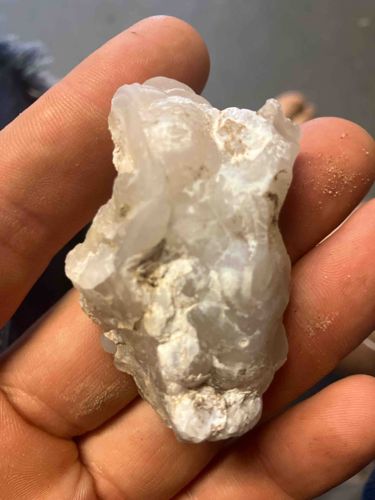
Unidentified Cryptocrystalline Quartz Mineral Specimen
The item is a raw, unpolished mineral specimen, likely a variety of quartz such as chalcedony or agate, held in a hand for scale. Its physical characteristics include an irregular, amorphous shape with no distinct crystal faces, typical of cryptocrystalline structures. The color is predominantly a milky white to light grey, with areas exhibiting a translucent quality and a waxy to dull luster. Scattered brown and sandy discolored patches suggest the presence of natural inclusions, dirt, or weathering. The texture appears somewhat botryoidal or mammillary in places, with rounded, lumpy formations, but also displays some sharper, fractured edges indicating recent breakage or natural cleavage. There are no discernible markings, signatures, or stamps, which is common for raw mineral pieces unless specifically collected by a geologist. The condition appears natural and un-altered, showing typical wear and surface irregularities consistent with a specimen extracted from its natural environment. Its estimated age is geological. The piece possesses a relatively high density given its size, which is roughly comparable to the palm of a hand. Quality indicators include its translucency in thinner areas and the absence of significant man-made damage. It's a natural formation, showcasing the unique growth patterns of this mineral type.
AI-Generated Appraisal Disclaimer
Estimated Value
$5-15
Basic Information
Category
Mineral Specimen
Appraised On
March 5, 2026
Estimated Value
$5-15
Item Description
The item is a raw, unpolished mineral specimen, likely a variety of quartz such as chalcedony or agate, held in a hand for scale. Its physical characteristics include an irregular, amorphous shape with no distinct crystal faces, typical of cryptocrystalline structures. The color is predominantly a milky white to light grey, with areas exhibiting a translucent quality and a waxy to dull luster. Scattered brown and sandy discolored patches suggest the presence of natural inclusions, dirt, or weathering. The texture appears somewhat botryoidal or mammillary in places, with rounded, lumpy formations, but also displays some sharper, fractured edges indicating recent breakage or natural cleavage. There are no discernible markings, signatures, or stamps, which is common for raw mineral pieces unless specifically collected by a geologist. The condition appears natural and un-altered, showing typical wear and surface irregularities consistent with a specimen extracted from its natural environment. Its estimated age is geological. The piece possesses a relatively high density given its size, which is roughly comparable to the palm of a hand. Quality indicators include its translucency in thinner areas and the absence of significant man-made damage. It's a natural formation, showcasing the unique growth patterns of this mineral type.
Get Your Items Appraised
Instant estimates of your treasures with AI-powered instant appraisals